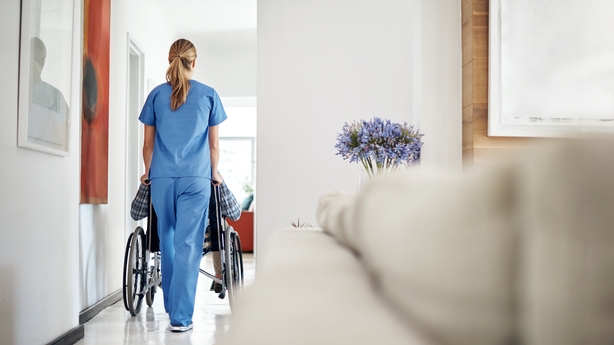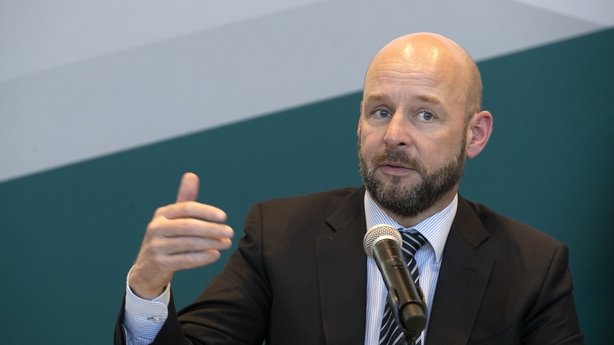The country's Chief Medical Officer has said he does not believe pubs will re-open in June.
Dr Tony Holohan said the economy should get on with the job of preparing to implement public health advice in the settings they are in.
He said venues like bars and restaurants need to put in place protections for staff and their customers for when the time is right for them to reopen.
Speaking on RTÉ's Today with Sean O'Rourke, Mr Holohan said: "Pubs came to us in March and said we understand your public health advice and we don't think we can implement it.
"So that's why pubs were asked to close. I know many parts of society are making a case to be in earlier phases. I don't see any realistic prospect of pubs opening in June, is the straight answer," he stated.
He also said there is "very little prospect" of bars and pubs opening in June due to the difficulty in adhering to restrictions necessary to maintain physical distancing.
The National Public Health Emergency Team discussed additional measures today regarding travel into and out of Ireland as we enter a new phase of restrictions due to the Covid-19 pandemic.
Tony Holohan said the NPHET woulld examine if any changes need to be made to that specific aspect of the coronavirus plan.
Dr Holohon said the country is doing well and we have managed to suppress the spread of the infection but there has been an impact among vulnerable groups and in nursing homes settings.
However, he said we have never had more than 1,000 cases occurring in a single day.
He said travel is a challenge, and the recommendation is that people avoid all non-essential travel both off the island and back into Ireland.
He said the NPHET would discuss the issue of compulsory quarantining and will give advice to Government and it is up to it to decide on what happens.
The Chief Medical Officer has said the issue of travel, and compulsory quarantine will be discussed at today's meeting of the National Public Health Emergency Team (NPHET).
Dr Holohan said advice will be given to the Government subsequent to the meeting, but he said social distancing will be the "challenge".
He said Ireland will look to the progress being made in other countries "to see how we might aspire to get back to the same level of movement between countries" before Covid-19.
"This will allow us enough time to see if something we haven't predicted in terms of the behaviour and the spread of infection.
"We need to be able to pick that up before we move on to the next stage."
No one is in a position to say with any certainty that a vaccine will be created for Covid-19, according to Dr Holohan,
He said huge efforts are under way internationally to develop a vaccine and drugs to treat the virus, some of which are showing "some promise", he said.
"We have not seen any game changers if I might put it that way, in the way we've seen other drugs get rid of viruses like Hepatitis C.
"But there is a huge amount of scientific work being carried out around the world to get drugs to treat the impact of the infection."
Children to be included in 'flu vaccination programme
He said his department is looking towards children receiving the 'flu vaccine this autumn, as he said the number who get the 'flu vaccine needs to "minimise the impact of that infection."
"Flu, each year affects people in many of the same vulnerable groups that we have identified now.
'Flu may not have the same severity as Covid-19 but it spreads in the same settings, healthcare settings, nursing homes, schools.
"That is why we hope to bring children into the group which should receive the vaccine."
Dr Holohan said the NPHET thinks the measures announced by Taoiseach Leo Varadkar on 16 March were correct at that point, but they wanted to make sure we did not introduce the draconian measures that are now in place earlier than they needed to be because they would have been less effective.
He said there has been a high level of compliance around the measures with hand hygiene, cough etiquette etc and people are listening to the advice.
Dr Holohan has acknowledged that the advice around cocooning is tough, but said people in these groups must not put themselves at risk.
Visitors did not bring Covid-19 into nursing homes, says Holohan
In respect to nursing homes, Dr Holohan said visitors did not bring the infection into nursing homes. He said when visitor restrictions were introduced, that point was before any clusters of infections were reported.
He said more than an incubation period had elapsed before the clusters appeared in nursing homes.
Dr Holohan said he stands over the assessment that visitor restrictions were not needed until the point when they were introduced.

He said the population experienced the infection and that staff experienced the infection - he said we put in interventions so that staff so could stay in other settings so as to not pass on the virus.
He said this is a highly transmissible virus - he said Europe was an epicentre for the virus, but the southern hemisphere is not an epicentre so direct comparisons are not valid.
Dr Holohan said Ireland has done as well if not better than other countries in western Europe. He said many of those countries have not been able to suppress the virus across the community in the way we have.
He said when they followed the track of the infection and saw changes it was then that they changed the advice in relation to nursing homes.
He said they wanted to be sure there was clear public health advice and the public would follow that.
With regards to the Leaving Cert examination, Dr Holohan said the NPHET gave advice to the Department of Education.
He said the fall in new cases is encouraging, but the advice is around a range of different measures and the time frame around those measures - every three weeks - but the decision around the exams is a matter for the Minister for Education.
Dr Holohan said the NPHET has a job to do - to give the public advice and wants to ensure that each sector puts in place their own plans to deliver services in line with that advice.
He said it is necessary to give three weeks between each phase to allow enough time to see if something we haven't predicted in terms of the virus is picked up.
Expert warns no room for complacency over Covid-19
It comes after the chair of the Epidemiological Modelling Group advising the NPHET said there is no room for complacency when considering the latest statistics on the spread of Covid- 19.
Figures released yesterday showed that the reproductive rate of the virus is around 0.5.
However, Professor Philip Nolan said the health service still needs the capacity to cope with a possible future surge.

The number of new cases of Covid-19 reported to the Department of Health yesterday was 137 - the lowest number of new cases since the end of March
A fall in admissions to hospitals and intensive care wards was also reported
Yesterday evening there were 569 confirmed cases of Covid-19 in acute hospitals and 311 suspected cases
There were 76 patients with Covid-19 in intensive care units and 154 vacant critical care beds
Prof Nolan warned against complacency saying individuals will have to evaluate their risk of spreading or catching the virus and the Department of Health and the Health Service Executive have to retain the capacity to mobilse quickly if there was in increase in infections in the future.
Around 80% of cases of Covid-19 will be a mild to moderate illness, close to 14% have severe disease and around 6% are critical.
Generally, you need to be 15 minutes or more in the vicinity of an infected person and within 2 metres of them, to be considered at-risk, or a close contact.
Meanwhile, Minister for Health Simon Harris, will open a Covid Assessment Hub at the Mater Hospital in Dublin this morning designed to work specifically for vulnerable groups in the inner city.
The hub will include a mobile unit to test and treat marginalised groups.
Additional reporting Sinead Crowley

